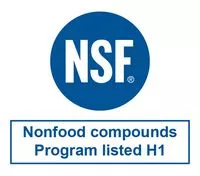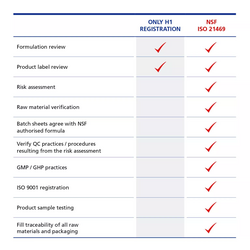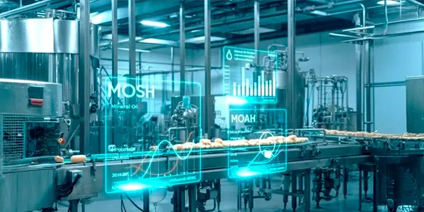NSF H1 Food grade lubricants
NSF H1 lubricants are food grade lubricants used in the food and beverage industry. In this area, very special requirements are placed on the lubricating oils and greases used. In the manufacturing process of food and beverages, contact with the lubricants used can often not be avoided from a technical point of view. Thus, they must be safe to use.
In addition, the specialty lubricants must guarantee a smooth manufacturing process, meet the high technical requirements of the machines and be able to keep production efficiency at a constant level. All of this with additional consideration of food safety during the entire production process.
Each food production facility has different requirements for NSF H1 lubricants. In the production of frozen goods, for example, the challenge lies in the extreme cold, in the case of preservation in the extreme heat. Food grade lubricants must also be resistant to salts, blood and fat in meat processing. In the production of fruit juices, on the other hand, resistance to aggressive fruit acids is required. Even in the production of cakes and bread, NSF H1 lubricants must be able to withstand a number of adversities. In this case, it is mainly sugar and flour dust.
The selection and formulation of food grade greases, compressor oils, hydraulic fluids, gear oils or refrigeration machine oils is complex and requires a great deal of practical experience and corresponding specialist knowledge. The comprehensive portfolio offers the right lubricant for most applications in the food and beverage industry.
Performance of food grade lubricants
Due to their chemical composition, synthetic lubricants in particular not only meet all the requirements of the FDA (Food and Drug Administration), they also have high-quality technical properties. NSF H1 lubricants are often even superior to conventional lubricants in terms of low-temperature properties, water resistance, longevity and resistance to environmental influences. However, the selection of a suitable lubricant is not always easy, as these must meet the technical requirements and ensure compliance with the legal regulations in terms of food safety and consumer protection. In the food and beverage industry, lubricants may only be used if they have been explicitly approved. For some time now, there has even been a new EC directive that also requires approval for feed production.

The National Sanitation Foundation (NSF) is an institution that has been responsible for carrying out tests for the protection of food, writing standards and guidelines and certifying products since the mid-1940s. The HACCP point concept (Hazard Analysis and Critical Control Points Concept), which has been in use in the European Union since 2006, also includes NSF approval when it comes to making food production consistently safe.
If lubricants can come into contact with food during the production process, the company needs NSF approval for these greases or oils. It does not matter whether the contact with the products is unavoidable or only possible occasionally. According to international regulations, the company may only use lubricants that have been marked with H1 by the NSF.
The NSF offers a variety of services for a wide range of industries. One area of the NSF that is relevant for manufacturers of lubricating oils and greases is the certification of non-food compounds. In terms of their materiality, non-food compounds are not food, but can be used in the food and beverage industry. Due to possible food contact, strict rules and strict standards apply to non-food compounds. The NSF has launched a special certification program for these components, which also include H1 food grade lubricants.
In addition to NSF H1 certification, there are several other important certifications and classifications in the food and beverage industry that must be taken into account.
- H1 lubricants are used when no or only incidental contact with food is to be expected under normal operating conditions.
- H2 lubricants are used on equipment in the food production process where food contact can be completely excluded.
- H3 lubricants are used as corrosion protection, e.g. for knives and hooks. As with H2, the possibility of contamination with food must nevertheless be completely excluded.
- 3H lubricants are used when direct and continuous contact between the lubricant and food products is unavoidable.
- Food Grade describes auxiliary and operating materials that are preferably used in the food and beverage industry and comply with the laws and guidelines that apply there.
- ISO 21469: Internationally valid standard that takes into account the hygiene requirements during the entire life cycle of an H1 lubricant from formulation to production and application. The test procedure is carried out by the NSF and is considered the strictest certification for food grade lubricants worldwide.
- Kosher: Lubricants that are kosher certified may be used in the production of foods that are produced in compliance with Jewish dietary laws.
- Halal: Lubricants according to Halal certification may be used in the production of food in compliance with Islamic dietary laws.
- EHEDG: The European Hygienic Engineering Design Group is a cooperation between machine manufacturers, the food industry, research institutes and authorities, which has set itself the goal of promoting food safety through improvements in hygiene technology and planning in all areas of food production.
- HACCP: A quality tool designed to check the production of food according to Hazard Analysis and Critical Control Points. This is intended to prevent consumers from becoming sick or injured in connection with food.
- BRC: Global standard for food safety from the British Retail Consortium (BRC), according to which companies that handle and process food can be certified.
In the food, cosmetics, pharmaceutical, beverage and animal feed industries, lubricants with ISO 21469 certification are indispensable. Thus, the manufacturer of food grade lubricants shows that the production of its H1 lubricants was also carried out under strict hygiene measures. The annual audits are conducted by the NSF and also take into account upstream and downstream processes such as the packaging or storage of the food lubricants.
FUCHS has various production sites around the world that are certified according to ISO 21469. Not only in Germany and in Spain, but also in the USA, in Brazil and in South Africa. We can therefore guarantee a high level of food safety for our H1 lubricants worldwide.
Click here to download the ISO 21469 certificate from FUCHS Spain.
The potential transfer of hydrocarbon compounds to food has been analyzed and discussed for a long time. The chemical compounds MOSH (mineral oil saturated hydrocarbons) and MOAH (mineral oil aromatic hydrocarbons) are of primary interest. Reports appear again and again in the media that food has been contaminated accordingly.
Mineral oils should never come into contact with food. If they get into the human body through food intake, they can cause health damage.
MOSH and MOAH can basically have different origins. If a high proportion is detected, all possible causes must therefore be checked. Contamination often comes from packaging materials that come into direct contact with the food. To avoid contamination by lubricants, H1 lubricants should always be used in the production process of food and beverages.
Product finder
All about MOSH&MOAH
LCCP Audit, an expert service
Case studies
Serving solutions for each industry
The more sensitive and demanding the application, the more important is the use of suitable lubricants. Wherever food, drinks, or animal feed are produced, processed, bottled, or packaged, our CASSIDA specialty lubricants from FUCHS satisfy the highest safety requirements along with the highest technical performance. They thereby provide for a smooth production process, a high level of efficiency, and a longer operating life for your machinery and systems.









